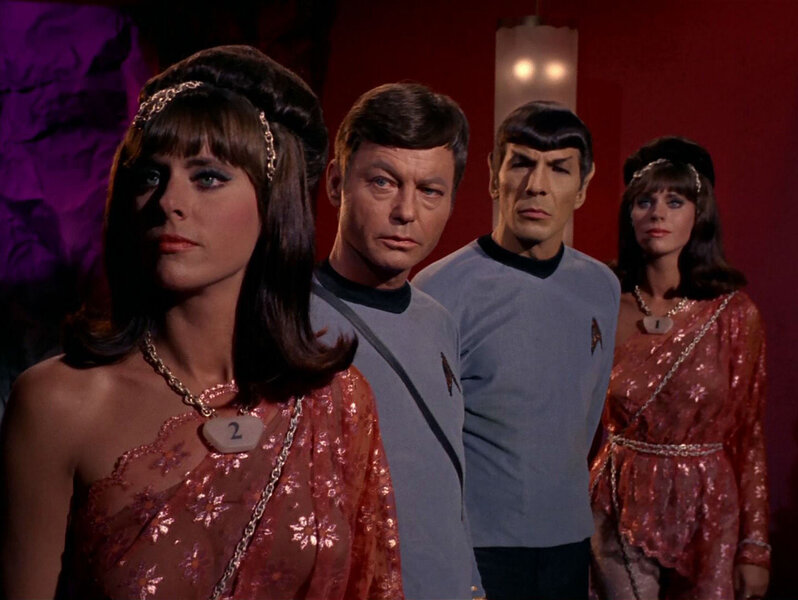Create a free profile to get unlimited access to exclusive videos, sweepstakes, and more!
Star Trek: Picard expands Data's family with a huge canon twist

If you thought the first episode of Star Trek: Picard rowdily rewrote Data's android family history, then there's no way you could have seen this coming. In its next-to-last episode of Season 1, Star Trek: Picard has changed the Data-Soong family tree in a big way. Again. But what does this mean? And is this change even legit?
As Picard heads toward its conclusion with the two-part episode "Et in Arcadia Ego," the first part of this grand finale poses even more questions than it answers. But, when it comes to the specifics of the story and the aesthetics of the production, what we are dealing with is more than just a retcon of Data's history. Superficially, this episode gives us a lot of familiar feelings, but underneath all of that is a brilliant philosophical inversion of countless episodes of Star Trek: The Next Generation. It's also a fascinating parallel to another Brent Spiner arc in the prequel series, Star Trek: Enterprise.
**Spoilers ahead for Star Trek: Picard Season 1, Episode 9, "Et in Arcadia Ego, Part 1."**
After the La Sirena meets some giant space orchids and then crash-lands on the planet that Soji calls Coppelius, for the first time, in the entire season, Picard puts the vast majority of its characters all in the same physical place. The Borg Cube carrying Seven, Elnor, and the remaining XBs is here; Narek eventually crash lands; and, front and center, Soji is reunited with her android family, who've all been living in secret in what appears to be an idyllic, utopian paradise.
Visually, as we enter the city of happy Synths, the colors and activities will remind even casual viewers of isolated utopias glimpsed in various Treks of old. There are nods to the carefree Edo people of the planet Rubicun III from the infamous, scantily-clad TNG episode "Justice." But the matching, flowing colors worn by various androids (all twins!) also recalls similar android duplicates in the TOS episode "I, Mudd." Meanwhile, the untouched, isolated utopian aspect of the android culture is also reminiscent of "The Apple" from TOS, "Who Watches the Watchers?" from TNG, and even the immortal (and peaceful) Ba'ku of Star Trek: Insurrection. Visually, and philosophically, this is the variety of strange new world that isn't so strange — a planet populated by people unwilling to mess up their culture by joining the galactic hubbub beyond their own borders.
But there's a twist or two to this familiar Trek setup. First up, it's not only androids living here. In addition to the late Bruce Maddox helping to create these androids in the first place, a long-lost brother of Data — Dr. Altan Inigo Soong (played by Brent Spiner, of course) — is also in on the action. To be clear, this is explained very quickly with one line: "My father had me, but he created Data."
Just so we're clear, this new character Altan is Dr. Noonian Soong's human son, which makes him Data's half-brother, or, perhaps, regular brother. In a sense, this is another classic trope: the case of secret family members. From the revelations that Spock had two secret siblings (Sybok and Michael Burnham), to Kirk's secret son in The Wrath of Khan, to the slow unfurling of Data's family tree in The Next Generation, the idea of retroactive family members is a pretty well-established Trek tradition.
And while we might wonder about the identity of Altan's biological mom (probably Juliana O'Donnell from the TNG episode "Inheritance") the existence of a biological member of Data's family tree is just one piece of a larger thematic puzzle.
With the exceptions of Fionnula Flanagan as Data's android "mother," Juliana in "Inheritance," Hallie Todd as Data's first "daughter" in "The Offspring," and of course, Isa Briones in Picard, all other members of Data's family have been played by Brent Spiner and only Brent Spiner. Data's evil android brother, Lore, was played by Spiner, and Noonian Soong — both in flashbacks and as a dying old man — was played by Spiner. And even Soong's 22nd-century ancestor, Arik Soong, from the prequel series Enterprise, was played by Spiner, too. "Et in Arcadia Ego Part 1" continues this tradition with Spiner as Altan Soong, and the cyberneticist certainly has more in common with geneticist Arik Soong or the android Lore than he does with any other members of Data's family. Here's why.
In the Enterprise episodes "Borderland," "Cold Station 12," and "The Augments," Arik Soong was the person who created the genetically "superior" Augments, who he frequently referred to as his "children." This guy pretty much knew that the apex of his goal would also lead to his own death. If the Augments (of whom Khan was a member) took over the galaxy, then that meant, "inferior" beings, like Arik Soong himself, would be killed, too. And now, two centuries later, with Altan Soong in Picard, it's exactly the same thing.
After Soji's amoral android sister Sutra (also Isa Briones) gains the knowledge that a secret A.I. alliance could wipe out organics and save synthetic life, Altan Soong — like his 22nd-century ancestor Arik — is totally down with this, even if it could end in his own death. Sutra even suggests that her spiritual mother, Dr. Jurati, should be willing to die for all the Synthetics.
Of course, in a very Next Generation move, Jean-Luc's proposed solution is to give a few stirring speeches. First, he tries to convince Soji that sacrificing all organic life to save Synthetics is morally wrong, and when that doesn't work, he literally tries to convince all these androids to get on a spaceship with him and run away. But the person who shuts him down is Data's human brother, Altan.
"They didn't listen to him about Mars, kids. And they won't listen to him now," he says.
If this were an episode of The Next Generation, its possible Jean-Luc's various speeches would have worked. But because Picard is specifically concerned with dismantling a post-Next Generation world, it backfires.
By the end of the episode, we're led to believe that all the Synths, including Soji, are going to call upon their A.I. overlords and destroy all organic life. It seems obvious that the final episode of Picard won't result in everyone dying, but the existence of Altan Soong's "golem" — an android body prepped for a human mind — does suggest that human beings could survive something like this, and perhaps, maybe they already have.
There's also a good deal of ambiguity about whether or not Sutra's interpretation of the Admonition is correct. For the Zhat Vash, the Admonition confirmed their worst fears about artificial life and led them on a centuries-long quest to destroy it. For Sutra, the Admonition also confirmed her worst fears about organics, and now, it has prompted her to start a jihad against all non-Synth life. But, the thing is, both sides are operating from a place of fear.
From the classic episode "Arena" to TNG's "Encounter at Farpoint," the canon of Star Trek is replete with examples of all-powerful alien beings watching and judging the way various species respond to tests of higher morality. These bigger questions usually don't come down to one side being right or wrong, but instead, a deeper truth of how people behave. At the top of the episode, Picard was ready to save Narek's life, and told Soji, "There's a difference between killing an attacking enemy, and watching him die."
And as Picard speeds toward its finale, that distinction — preventing death versus causing suffering — feels like the key that will make this series both very unique and classically simpatico with the rest of Star Trek simultaneously.
Star Trek: Picard airs its final episode of Season 1 on CBS All Access on Thursday, Mar. 26.
The views and opinions expressed in this article are the author's, and do not necessarily reflect those of SYFY WIRE, SYFY, or NBC Universal.

















